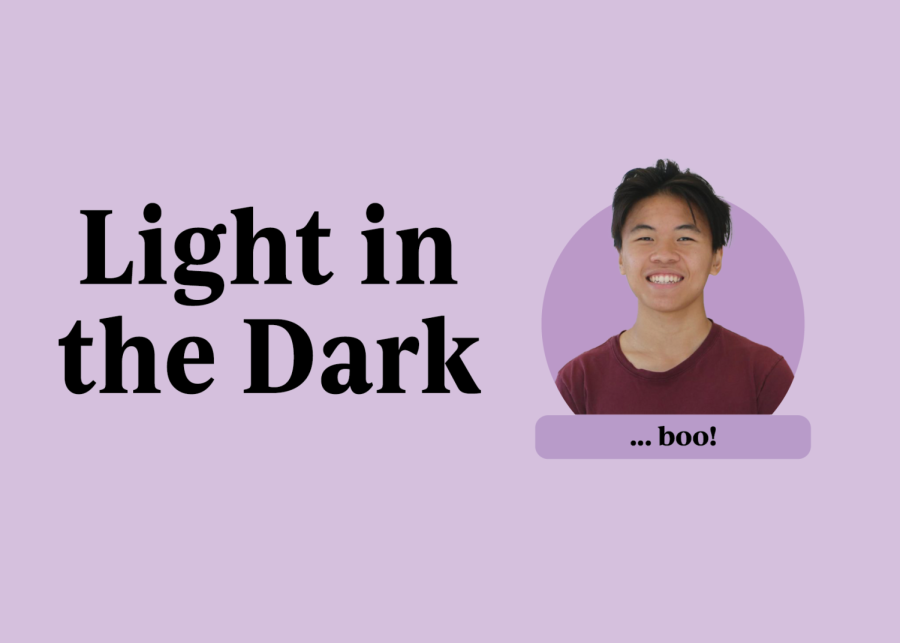I am afraid of the dark. Firmly clutching my flashlight, my 1 a.m. excursions to the pantry downstairs were always filled with tension. I would imagine the horrors that awaited me in the shadows: monsters, murderers, my mom.
Since prehistoric times, we’ve been programmed to fill in blanks. From an evolutionary standpoint, inference can mean the difference between finding clean and contaminated water, from catching to becoming prey.
But that was thousands of years ago. Today, lingering thoughts of horror movies impede my snack runs, intrusive ideas that alarm danger at every corner. In the age of information, nearly anything is accessible everywhere, so much so that we often drown in its excess. Contextless fragments of truth drift and attach to impressionable hosts. Hosts fill in the unknown—they’re hard-wired to do so. They begin to fear what they imagine, and with good intentions, they warn others of the dangers they expect. These half-truths proliferate; the virus spreads.
Take anti-Asian hate. Although its origins date back to the 19th century, the recent resurgence of anti-Asian violence can be largely attributed to a certain global pandemic. After the most powerful man in the country described COVID-19 as the “Chinese virus,” many began to fear Asians: I remember the heads that would turn whenever I coughed or sniffled. When half-truths are seeded, paranoia blooms. Yes, COVID-19 was discovered in China. No, not all Chinese people have the virus.
COVID-19 isn’t the only pandemic we now face. Following close behind, the virus of incomplete information can be just as deadly.
But there’s a cure. When you’re scared of the dark, how do you feel? If someone else tells you all about how there AREN’T monsters in the shadows, do you believe them? Why should you? To you, neither of you can see. The cure? Turn on the light (shocking stuff). You’re cured when you see for yourself that those perceived threats had always been empty.
As National Take a Chance Day approaches on April 23, try to listen to someone. The next time you sit down with the less politically correct side of the family or connect with an old acquaintance who just can’t trust science, consider what they fear. Take the time to see from their perspective; in other words, turn off your light. Only then can you truly understand their fear and the dangers they imagine. Ask them what would need to happen for them to change their perspective—how can you turn on their light? For those stranded in the unknown, ensnared by fear, patience and compassion go a long way.
I used to be embarrassed that I was scared of the dark. But now, I realize that maybe, I’m just trying to survive; we’re all just trying to survive. After all, some fears are warranted; we all know what will happen if my mom catches me downstairs.
The views in this column do not necessarily reflect the views of the HiLite staff. Reach Daniel Tian at [email protected]
To see more of Daniel’s work, click here.




























![Keep the New Gloves: Fighter Safety Is Non-Negotiable [opinion]](https://hilite.org/wp-content/uploads/2024/12/ufcglovescolumncover-1200x471.png)
















































![Review: “We Live in Time” leaves you wanting more [MUSE]](https://hilite.org/wp-content/uploads/2024/12/IMG_6358.jpg)
![Review: The premise of "Culinary Class Wars" is refreshingly unique and deserving of more attention [MUSE]](https://hilite.org/wp-content/uploads/2024/12/MUSE-class-wars-cover-2.png)
![Introducing: "The Muses Who Stole Christmas," a collection of reviews for you to follow through winter [MUSE]](https://hilite.org/wp-content/uploads/2024/12/winter-muse-4.gif)
![Review: "Meet Me Next Christmas" is a cheesy and predictable watch, but it was worth every minute [MUSE]](https://hilite.org/wp-content/uploads/2024/11/AAAAQVfRG2gwEuLhXTGm3856HuX2MTNs31Ok7fGgIVCoZbyeugVs1F4DZs-DgP0XadTDrnXHlbQo4DerjRXand9H1JKPM06cENmLl2RsINud2DMqIHzpXFS2n4zOkL3dr5m5i0nIVb3Cu3ataT_W2zGeDAJNd_E-1200x884.jpg)
![Review: "Gilmore Girls", the perfect fall show [MUSE]](https://hilite.org/wp-content/uploads/2024/11/gilmore-girls.png)
![Review in Print: Maripaz Villar brings a delightfully unique style to the world of WEBTOON [MUSE]](https://hilite.org/wp-content/uploads/2023/12/maripazcover-1200x960.jpg)
![Review: “The Sword of Kaigen” is a masterpiece [MUSE]](https://hilite.org/wp-content/uploads/2023/11/Screenshot-2023-11-26-201051.png)
![Review: Gateron Oil Kings, great linear switches, okay price [MUSE]](https://hilite.org/wp-content/uploads/2023/11/Screenshot-2023-11-26-200553.png)
![Review: “A Haunting in Venice” is a significant improvement from other Agatha Christie adaptations [MUSE]](https://hilite.org/wp-content/uploads/2023/11/e7ee2938a6d422669771bce6d8088521.jpg)
![Review: A Thanksgiving story from elementary school, still just as interesting [MUSE]](https://hilite.org/wp-content/uploads/2023/11/Screenshot-2023-11-26-195514-987x1200.png)
![Review: "When I Fly Towards You", cute, uplifting youth drama [MUSE]](https://hilite.org/wp-content/uploads/2023/09/When-I-Fly-Towards-You-Chinese-drama.png)
![Postcards from Muse: Hawaii Travel Diary [MUSE]](https://hilite.org/wp-content/uploads/2023/09/My-project-1-1200x1200.jpg)
![Review: "Ladybug & Cat Noir: The Movie," departure from original show [MUSE]](https://hilite.org/wp-content/uploads/2023/09/Ladybug__Cat_Noir_-_The_Movie_poster.jpg)
![Review in Print: "Hidden Love" is the cute, uplifting drama everyone needs [MUSE]](https://hilite.org/wp-content/uploads/2023/09/hiddenlovecover-e1693597208225-1030x1200.png)
![Review in Print: "Heartstopper" is the heartwarming queer romance we all need [MUSE]](https://hilite.org/wp-content/uploads/2023/08/museheartstoppercover-1200x654.png)




